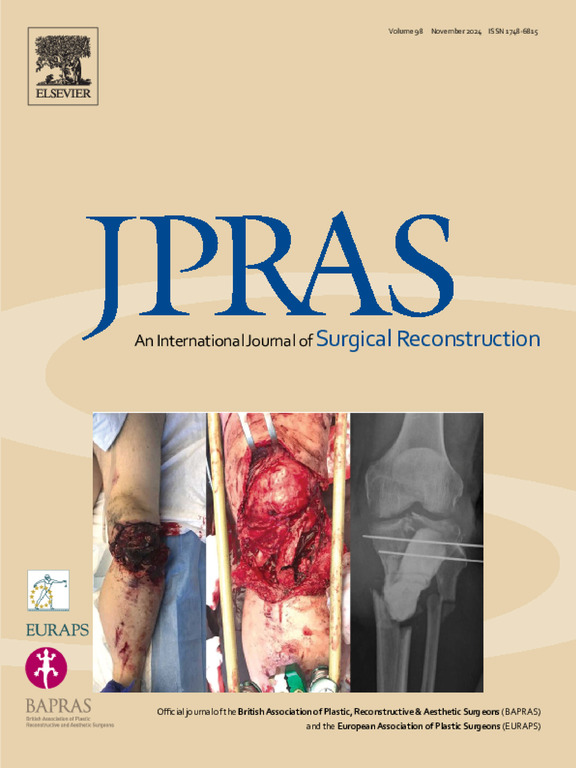乳房试验中自体脂肪移植(AFT)用于全乳房重建的肿瘤安全性的初步数据
IF 2
3区 医学
Q2 SURGERY
Journal of Plastic Reconstructive and Aesthetic Surgery
Pub Date : 2025-06-13
DOI:10.1016/j.bjps.2025.06.002
引用次数: 0
摘要
背景:与植入式乳房重建(IBR)相比,通过自体脂肪移植(AFT)进行全乳房重建可提高生活质量。假设是AFT可能影响肿瘤预后。正如研究方案中预先确定的那样,我们提供了乳房试验的局部区域复发数据。方法本前瞻性队列研究基于乳腺试验的参与者,比较乳房切除术后的AFT和IBR。患者按1:1随机分为AFT组或IBR组。肿瘤随访,包括临床检查和影像学检查,在干预组重建后的五年里每年进行一次。从医疗记录和国家病理数据库中收集了第一个肿瘤的人口统计学、肿瘤特征和治疗细节数据。分析的主要终点是局部-区域乳腺癌复发(LRR)。结果AFT组共77例,对照组86例。从乳腺癌诊断到首次接触AFT的时间被认为是控制时间,以尽量减少不朽时间偏差。AFT组8例,对照组5例出现局部-区域复发。与对照组相比,这没有显著差异(风险比1.74 (95% CI: 0.56 - 5.44, p = 0.341)。校正混杂因素后,差异仍然不显著。结论根据研究方案,对乳腺试验的局部-区域复发进行了分析:aft -重建与ibr -重建之间无显著差异。这项研究的肿瘤终点不够有力,人群过于异质性,并不是所有的参与者都接受了推荐的肿瘤治疗。本文章由计算机程序翻译,如有差异,请以英文原文为准。
Preliminary data on the oncological safety of autologous fat transfer (AFT) for total breast reconstruction from the BREAST trial
Background
Total breast reconstruction via autologous fat transfer (AFT) improves the quality of life compared to implant-based reconstruction (IBR). Hypotheses are that AFT may affect oncologic outcomes. As predetermined in the study protocol, we present the loco-regional recurrence data from the BREAST trial.
Methods
This prospective cohort study is based on participants from the BREAST trial, comparing AFT to IBR after mastectomy. Patients were randomised 1:1 to AFT or IBR. Oncological follow-up, including clinical exams and imaging, was conducted annually for five years post-reconstruction in the intervention group. Data on demographics, tumour characteristics, and treatment details of the first tumour were collected from medical records and national pathology databases. Primary outcome for analysis was loco-regional breast cancer recurrence (LRR).
Results
In total, 77 patients were included in the AFT arm and 86 in the control arm. Time from breast cancer diagnosis to first AFT exposure was considered control time to minimise immortal time bias. Eight patients in the AFT group and 5 in the control group experienced loco-regional recurrence. This was not significantly different (hazard ratio 1.74 (95% CI: 0.56 – 5.44, p = 0.341) in comparison to control. After adjustment for confounders, the difference remained non-significant.
Conclusion
Per study protocol, loco-regional recurrence in the BREAST trial was analysed: no significant difference was observed between AFT-reconstruction and IBR-reconstruction. This study was underpowered for oncological endpoints, the population was too heterogeneous, and not all participants received recommended oncological care.
求助全文
通过发布文献求助,成功后即可免费获取论文全文。
去求助
来源期刊
CiteScore
3.10
自引率
11.10%
发文量
578
审稿时长
3.5 months
期刊介绍:
JPRAS An International Journal of Surgical Reconstruction is one of the world''s leading international journals, covering all the reconstructive and aesthetic aspects of plastic surgery.
The journal presents the latest surgical procedures with audit and outcome studies of new and established techniques in plastic surgery including: cleft lip and palate and other heads and neck surgery, hand surgery, lower limb trauma, burns, skin cancer, breast surgery and aesthetic surgery.

 求助内容:
求助内容: 应助结果提醒方式:
应助结果提醒方式:


